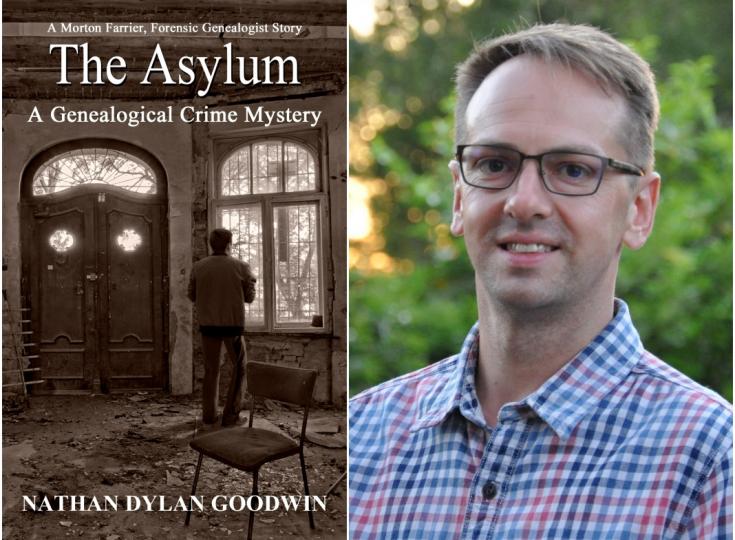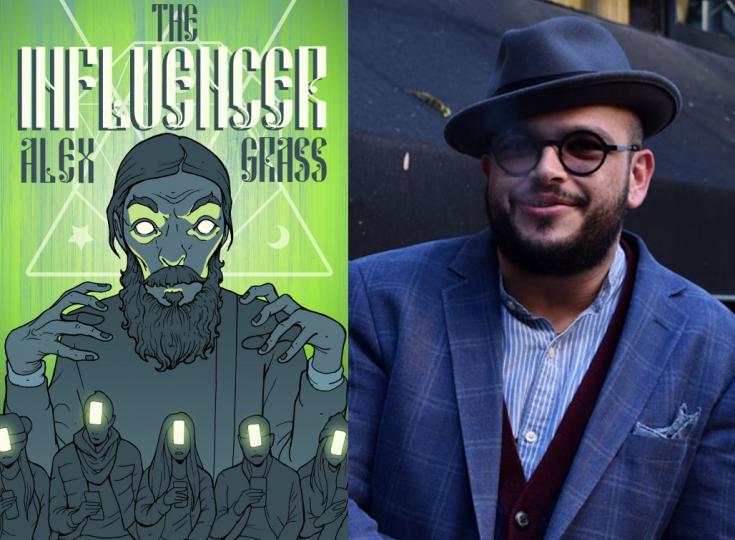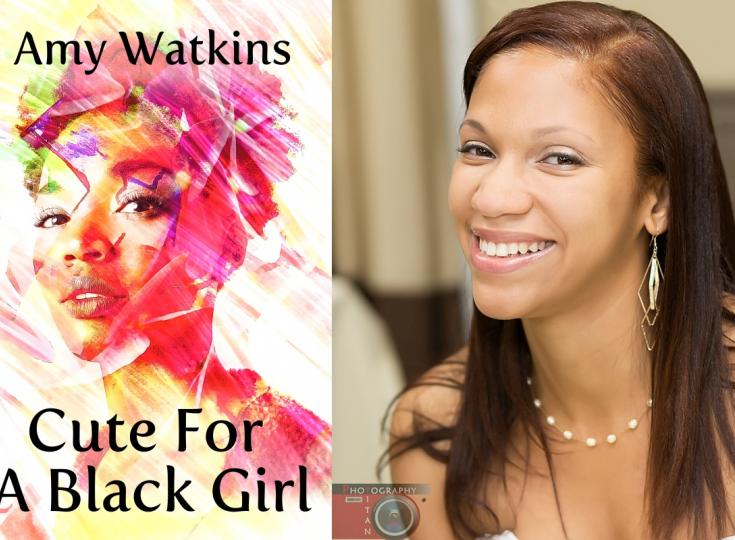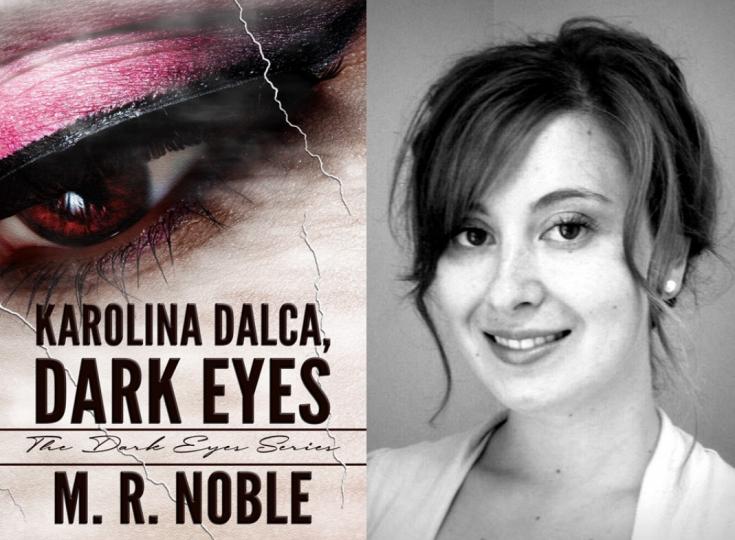Nathan Dylan Goodwin - An Asylum, Forensic Genealogy and Mystery

Born in the famed battle town of Hastings, England, Nathan Dylan Goodwin has always had a passion for writing in one form or another. Having gained a 2:1 degree in Radio, Film and Television studies, Nathan went on to gain a Masters degree in Creative Writing, from Canterbury Christ Church University. Nathan started his writing career with non-fiction, his first book 'Hastings at War' being published in May 2005. This was followed by three further local history books pertaining to the area around his home town of Hastings. His first forays into fiction writing culminated in the publication in 2013 of 'Hiding the Past' - a genealogical crime mystery novel. In his early forties, Nathan enjoys running, skiing, reading, genealogy, writing and time with his husband, son and dog. As our Author of the Day, he tells us all about his book, The Asylum.
Please give us a short introduction to what The Asylum is about.
The Asylum is a short taster story that begins The Forensic Genealogist Series. It features the main character, Morton Farrier, who appears in all of the books and who is the eponymous forensic genealogist. In each of the books, he has to solve a crime in the past using genealogy. In The Asylum, he is tasked with what appears to be a regular genealogy job but he is soon embroiled in a case of a mysterious death in the county asylum in the 1920s, which has far-reaching consequences for his client.
What inspired you to write about a genealogist who uncovers a surprise additional marriage?
I’m always on the look-out for interesting real-life stories involving family history, which can form the basis or an interesting thread of a fictional story. So, when I heard of a man who in later life had discovered that his father had been married prior to his marriage with the man’s mother, it set my brain to work. What if that marriage had produced a child? What had happened to the first wife? Why had he not ever mentioned it before? From then onwards, the story took on its own fictional life.
Tell us more about Morton. What makes him tick?
He’s very tenacious and passionate about finding the truth, even if that truth has been buried for decades or deliberately hidden; he always needs to resolve the case he’s working on, even if he has to occasionally break the rules. He’s a very good genealogist (better than me!) and knows how to look in places where others might not have thought to look. Also, coffee and wine make him tick.
The book has an interesting cover. Please tell us more about it.
Several years ago, whilst researching my Dengate family tree, I came across a sixth cousin in America, Patrick Dengate. He’s an artist with skills in a variety of media, so I turned to him when I realised that my covers required work in Photoshop to bring several elements together in one cover image. Usually, as happened with the cover for The Asylum, I hunt out some images which appeal to me with some vague ideas of what style I’m after and then he works his magic and produces a cover far better than I could ever have imagined. The cover of The Asylum features the silhouetted outline of the main character, Morton Farrier, standing in the ruins of the former Hellingly Mental Asylum in East Sussex.
Besides writing, what other secret skills do you have?
I used to be a primary school teacher and so have a fairly broad knowledge-base, but having skills might be stretching the definition of the word. I’m into running, skiing, gardening, genealogy, and photography but again, I’m not sure the word skill would be an accurate description.
Where does your fascination with genealogy come from?
I first became interested in genealogy around the age of twelve. It was my late maternal grandmother and her vast collection of family memorabilia, which caught my interest. I didn’t really know what I was doing at first but did have the foresight to interview some elderly relatives about what they knew before they died. I’ve always loved history and I find it fascinating to be able to plot my ancestors’ lives into different historical periods.
The Asylum is the first of a series. Did you plan from the start to make this into a series? How do the other books in the series tie in with this one?
No, I had no idea that it would become a series! I started writing the first full-length book, Hiding the Past, whilst studying for a master’s degree in Creative Writing. My fellow classmates were very supportive of the idea and encouraged me to keep writing it. The first version was quite different to what ended up becoming Hiding the Past. In fact, I had killed off the main character, Morton Farrier, at the end of the first draft. Thank goodness I changed the ending. Although each of the books can be read as a stand-alone story, where Morton must solve a crime in the past using genealogy, his own back story runs as a subplot throughout the series. At the age of fifteen he discovered that he had been adopted and it is his quest to discover his biological family, which continues through each book.
How much research did this book require from you to make the history part of it ring true? What was the most interesting aspect of this research?
I always spend a very long time on the research. I find that if I am thorough with my research, then the books tend to write themselves, as I intimately know the history of the period, the locations and the genealogy involved. Everything which Morton does in the books I have done myself during the research stage. I receive a great deal of support from the genealogical community and so I know that I have to get that aspect correct or else I would be bombarded with emails that something was wrong or not possible! For this story, I really enjoyed the research into county asylums, in particular the one at Hellingly, East Sussex, around which this story is based. Some records for asylum patients (usually prior to 1920) even have their photographs attached to their personal records and make for a haunting but fascinating read.
Have you always wanted to be a writer?
I loved history and English at school but didn’t ever believe that it would be something I could make a career from. I started in non-fiction and had four local-history books published about Hastings, East Sussex. My enjoyment was such that it led to my undertaking the Creative Writing course to see if I could make the transition over to fiction-writing. Being able to bring history and genealogy into my work is a triple bonus!
Is there something that compels you to write?
I can’t quantify what that something is but, yes, I am compelled to write. I’m very fortunate to be able to write full-time and I can honestly say that I’ve never had a day where I haven’t been eager to get writing. I have a list of book ideas which would take me a decade to write, so the ideas keep coming. I would certainly say that it’s something that I need to do as much as want to do.
Is there an underlying message you wish to relay about basic human nature through your characters?
The series frequently touches on the pandora’s box which is opened once Morton has uncovered the truth that he is so determined to reveal (on his client’s behalf). Mirroring the real-life usage of genetic genealogy, the later books increasingly involve DNA-testing and explore the moral and ethical dilemmas once something unexpected is discovered in the results.
Do you have any interesting writing habits? What is an average writing day like for you?
I don’t really have any quirky rituals or special underwear that I must wear in order to write. I like to read for a while first thing in the morning, then go down to my purpose-built cabin in my garden where I deal with any pressing emails before settling down to write. A good writing day for me is two thousand words, but inevitably there are days where I exceed that and days when I don’t get anywhere near it. An average working day is about six hours long for me, by which time my brain is on a go-slow and I’m in need of food.
What are you working on right now?
At the moment I’m working on a brand-new series, which is top-secret. I have given a few clues online, though. It will involve genealogy, DNA and the solving of murders with a new twist. More information will follow in my next newsletter. After that, my focus will be the second book in my historical fiction series, about a woman who is trying to find out what happened to her two sons during WW1, which is loosely based on someone in my own family. After that, I will be back with more Morton.
Where can readers discover more of your work or interact with you?
I’m on all the usual social media channels and release a newsletter every two or three months (sign up on my website). All my books are available on Amazon in Kindle and paperback and most in audiobook. Also available in good bookstores.
Website & newsletter: www.nathandylangoodwin.com
Twitter: @NathanDGoodwin
Facebook: www.facebook.com/nathandylangoodwin
Instagram: www.instagram.com/NathanDylanGoodwin
Pinterest: www.pinterest.com/dylan0470/
Blog: theforensicgenealogist.blogspot.co.uk




